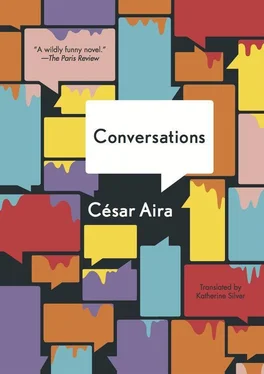But, with all the precariousness of his illusory existence, the goatherd also had to have a backstory, and though fictitious, that story had to be somehow “more,” that is, it had to be more intelligible than real stories, which unfold in a chaos of happenstance and twists and turns. To do this, it had to emphasize one aspect that real stories also contain: verisimilitude. This is a conventional term that includes everything mankind does in its perennial war against the absurd. In reality, there are things in any given context that cannot happen. I used as an example our “reality witness,” the life of the blond movie star: we would never see him standing at the door of a church in Beverly Hills asking for spare change, would we?
My friend raised his eyebrows and looked slightly skeptical, which I had been expecting.
Yes, we might see him there, if it were a joke or because he had lost a bet, or even as the result of a rapid decline due to drug and alcohol abuse. Stranger things have happened. But it was precisely the emphasis on the verisimilar I had mentioned earlier that made it impossible in fiction. A goatherd who had always lived in the mountains, who had never stepped foot in a city, who ate whatever the earth provided, that nonexistent goatherd, created by the imagination, his life circumscribed to an hour and a half of pulses of light and color, had to maintain complete factual coherence in order to remain plausible. Above all, he should not be confounded with the actor who was playing him. For example, as he was gathering his flock before descending the mountain in the evening, he couldn’t suddenly burst out with a sentence like: “Come on, hurry up, I’m having dinner with Madonna tonight.” Even if it were true that the actor was having dinner with Madonna that night, that sentence would be out of place in the character’s mouth. Indeed, out of place in exactly the same way as the presence of a Rolex on his wrist was out of place.
But, if it was impossible, how did it come about? Here, I said, we required the intervention of the imperfection that accompanies every human endeavor. It was a mistake, the result of a momentary distraction, a small error that escaped the vigilance of all involved, who were legion. To a certain extent it was understandable, given the complexity of a movie production of that size. The night scene shot on the mountainside with a dead goat; the crew measuring the light levels, the angles; making sure the cameras were functioning; the various scenes being filmed discontinuously. . The actor, who’d completely forgotten about his watch, was focused on the action, on showing his own best angle. . Anyway, that’s what had happened, there was nothing more to say about it.
To my surprise, my friend remained unconvinced. Moreover, he emphatically informed me — with that momentum typical of someone who has been waiting for the other person to finish talking in order to express their own opposing opinion — that my interpretation of the movie was completely wrong.
I answered simply that I had not offered an interpretation of the whole movie, which I had watched in fits and starts and without paying much attention. I was merely pointing out a single error.
He had not watched more of it or with more attention than I had, he said, the proof of which was that he hadn’t even seen the famous night scene with the dead goat. Hence, he also would not risk an interpretation, but he did feel he was in a position to refute me.
I had the irrepressible suspicion that he was going to come out with something very off the wall; surprise gave way to deep fear. One’s social life is full of such fears, and each person reacts to them according to his character. My character is rather shy, defensive, with an excess of politeness that renders me almost pusillanimous. I am one of those people who places delicacy above all other considerations and who discovers, time and time again, that cut-and-dry cruelty at the right moments can save many other moments of unpleasantness, but I never learn. I am also one of those people who prefers to live an entire life with a lie than live one uncomfortable moment of truth.
What I feared in this case (and by “this case” I meant the occasion in the café as well as its expansion in my memory when I relived the scene in the darkness of my bedroom in the middle of the night) was that my friend would utter a couple of sentences, a couple of words — he didn’t need many — that would show me that he was a complete and utterly hopeless idiot. Because the point of our little disagreement was so obvious as to be beyond any discussion. “The actor is not the character.” Who could deny that? Only someone with the mental level of a four-year-old child — and even a child that age would not be difficult to convince. In fact, it was not a matter of convincing him but merely giving him time to see it; only a momentary mental lapse, distraction, or partial deafness while listening to the proposition could leave room for doubt.
The fault was mine. I had asked for it by launching into a long harangue full of subtleties and philosophical considerations instead of limiting myself to the basics and letting him see it. I had done this out of intellectual vanity — the pleasure of hearing myself talk; inevitably it ended up complicating what was simple, muddling what was clear. If now it was shown — as seemed imminent — that he had not seen the obvious, I would be left dangling over an abyss, weighed down by all my verbiage.
Deep down it didn’t much matter if my explanation had been long or short, except that by making it long, I had created greater expectations and exposed myself to more serious disappointment: if he did not understand the difference between the actor and the character in a movie, he was an imbecile. And if he was an imbecile, I had no choice but to lose all intellectual respect for him and, which was worse, it meant that our conversations were wiped out as far as everything about them that was good and gratifying for me. Not only would I lose them in the future — for I would necessarily lose all desire to bring up interesting subjects or share intelligent reflections with a fool of that caliber — but I would retrospectively lose the conversations that we’d held throughout the years and that constituted such a central part of my life. This revelation detracted from the past — its richness became fictitious — and created a gaping hole that would be difficult to fill. How to fill a hole in the past from the present? My conversations themselves were somewhat retrospective. The nocturnal reconstructions I put them through — no less important a part of the pleasure they gave me — displaced them in time even while they were occurring; the second time contaminated the first and thereby a circle was drawn. I had been living in that magic circle, protected by its circumference, and its dissolution filled me with dread.
In order to appreciate the magnitude of my disappointment, I should explain just how important conversations are for me. At this stage of my life, they have become the single most important thing. I have allowed them to occupy this privileged position, and have cultivated them as a raison d’être, almost like my life work. They constitute my only worthwhile occupation, and I have devoted myself to enhancing their value, treasuring them through their reconstruction and miniaturization on my secret nocturnal altar. Hence, if I lose the day, I also lose the night. In fact, my nights even more than my days would be emptied out, for it is always possible to find other distractions during the day; nights are more demanding; their entire sustenance is intelligence and the complicity of intelligence, which becomes complicity with myself through my system of duplication. To lose that would be to lose myself, to remain alone in my aimless insomnia.
Читать дальше












